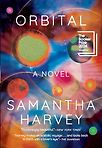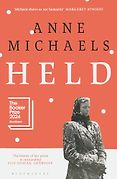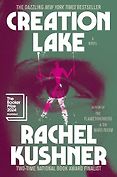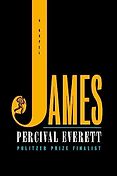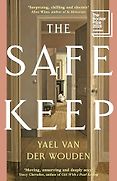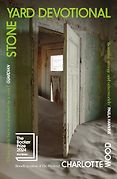Thank you for taking the time to talk to me about the Booker Prize shortlist. How many books did you have to read in your search for the best novels of 2024? And did you notice any trends among the submissions?
We read 156 books. I noticed there were a lot of books focusing on issues around identity in different ways—although perhaps I’m more acutely attuned to the idea because I made an album called Identity—and reconciling the past with the present. I mean, there was a lot of psychodynamic work, actually, dressed up in different ways and using a lot of different devices to get across psychodynamic thinking.
That’s interesting. Can you say more about the judging process?
We would have monthly meetings. Then we’d discuss our independent choices and try to find common ground. We also called books in.
We would re-review our end choices as well. A lot of the debate process involved us thinking through what we’d said or thought initially.
Let’s talk about the 2024 Booker Prize winning book, Samantha Harvey’s Orbital first.
I love this book! I love this book so much, I ended up writing a piece of music around it. I could hear the soundtrack very clearly in my head for the whole book, it spoke to me in lots of ways.
It’s a very poetic book. Samantha Harvey creates beautiful imagery. It gets into the lives of six astronauts from different countries: Russia, Britain, America, Japan, Italy. They are all reflecting upon their own lives through the prism of looking at the Earth from above. It’s very powerful in how it gives this beautiful overview. It’s meditative in lots of ways, but gives us insight into the lives of these very different characters that is very believable and interesting.
I grew up loving science fiction. I was a huge fan of Isaac Asimov, Larry Niven, Philip K Dick. So I found it interesting to read a modern science fiction book by a female writer. It was great to see this beautiful book, and I think there is a feminine quality to it that comes through, that softens the feeling of it in lots of different ways.
The concept reminded me of how the ‘Earthrise’ photograph is often credited with inspiring the environmental movement. Orbital feels like Earthrise in fictional form.
Yes, but it also contemplates the future of space travel as well, which is fascinating given what’s happening in America, with Elon Musk and Donald Trump.
Have you read Headshot by Rita Bullwinkel? It was on the longlist. I don’t want to give away too much away, but the ending is, like, on a different planet. Literally.
That’s the novel about the teenage boxers?
It’s a very quick read—maybe a couple of hundred pages—and it’s very enjoyable. All the different stories tie up together really well. And, yeah, it does take you on a mad segue at the end that you will either love or hate.
Anyway, it’s fascinating to have this idea of exploring space travel, and what it means for humanity, what it means for gender politics—that’s what was addressed in Headshot, but also in Orbital, in a way. I think there’s something profound in how it’s addressed.
I’d like us to step through the shortlisted titles next. Shall we start with Held by Anne Michaels? Why is it one of the best novels of 2024?
It’s a complex book in lots of different ways. It’s heavily layered. It’s interesting that she puts in somewhere an acknowledgement to Simon McBurney, who has a very famous play called Mnemonic, and I do think this book has echoes of that play. It moves around in lots of ways—in time, in location—and ties together lots of different ideas.
It starts off in the First World War. I guess it’s about questioning the nature of existence, and different concepts around consciousness, perception, the nature of reality. Issues that are tied to humanity’s efforts to understand the world, I guess. It’s very interesting because it comes in at so many different ideas from so many different angles.
It’s probably the hardest book to summarise, because it has so many tentacles, and they connect in ways that aren’t expected. It’s the least linear narrative of all the books we’ve chosen for the shortlist. At the same time, there’s a beautiful, poetic interconnectedness to all the different chapters and timeframes. The events kind of connect each of the stories and individuals together.
I’ve seen it described as “enigmatic”, “fragmentary”, even “formidable.” Does that sound right to you?
That’s it, absolutely. It’s a good way of putting it. It is fragmented, and yet I think it is conceptually cohesive. It’s fragmented in that, yes, there are a lot of different stories, but there is a thread that runs through them that you can feel. And it’s beautifully written. It’s like poetry.
It also—as I was saying before—looks at how history shapes the present, how the past is constantly being reinterpreted and reimagined. There’s a fluidity in how she moves between different periods that I enjoyed particularly.
The second book on the 2024 Booker Prize shortlist is Creation Lake by Rachel Kushner, who was last shortlisted in 2018. It features a spy-for-hire and a discussion of the origins of humanity. Tell us more.
Yes, the narrator is almost duped into becoming a spy in this group of people based in France. This book is interesting because it gets into ideas of primeval thinking. The conclusions of the book are very unexpected. There’s a whole section on cave frequencies, ancient voices and deep knowledge, and how our perception of reality is shaped by our ancestry and how we think about the past. It is done through an interesting device. And it takes turns that I would never have anticipated.
I really like Rachel Kushner’s writing. I loved The Mars Room.
Me too. We interviewed her back in 2018 around the time she was shortlisted.
She’s an incredible writer, masterful storyteller, and she questions a lot about the limitations of modern, technology-driven modes of knowledge and navigation. She talks about the power of intuition and sensory-driven approaches.
This is a book with an interesting story, but it uses that story in lots of ways to get you thinking and reflecting upon the nature of humanity, existence, and reality.
Parts of this book are like a spy novel, then she will depart on nonfictional meditations. I guess you could call it a ‘metaphysical thriller.’
Right. There’s a huge turn in the novel, and it goes in a very different, unexpected direction. Then, it becomes much more reflective, and wider and more expansive in how it approaches the nature of everything. It’s a deep and profound meditation, like you say.
Shall we talk about Percival Everett’s James next? It’s a rapid return to the Booker shortlist for Everett, who was a finalist in 2022 with The Trees.
Well, first of all, James is obviously connected to Mark Twain’s Adventures of Huckleberry Finn. It is not a retelling of that story, but in a way it’s the same universe. Percival has said himself that it’s not a correction. But is it a revisionist book? Yes, I guess it is. It’s from the perspective of Jim, or James, and we look at slavery from his perspective. We look at his incredible struggle, how his family is affected, how he has been separated from them and his struggle to reach them again.
It has a revenge theme, kind of. But I guess I look at it as there being some historical catharsis, reading this book in relation to historical racism and slavery. It’s more of a cathartic narrative than a derivative one.
So he takes Huckleberry Finn as a kind of mulch. Then grows his own.
I loved it, it’s a great book and he’s an incredible writer. It’s so interesting how he uses language. There’s an ironic twist. Which I enjoyed, and I enjoyed the masterful way in which he takes us on a journey—but one that is familiar to us. There’s something about this, in going into literature that we all know and addressing it in a different way that is powerful and adds an extra layer. What he has done is redress the historical nature of the fiction, but also the historical nature of an author.
Let’s talk about Yael van der Wouden’s The Safekeep next. Why do the judges think it’s one of the best novels of 2024?
There’s a strangeness to this novel. It’s talking about the Holocaust, and the Holocaust in relation to the ownership of a house. There are two women: Isabel, who lives in the house, and Eva, a guest who comes to stay for a season. Eva is Isabel’s brother’s girlfriend. Isabel realises that there’s something not quite right, an ulterior motive. Then, weirdly, they become closer and closer. It questions what it means to have claim on a home. The house represents so much to each of them. But they are also confronted by each other’s behaviour. For me, it really is a strange analogy with what has been going on in Gaza, yet it’s from the perspective of the Holocaust.
It is interesting as a book, and I thought it was clever, beautifully written, and totally believable. I liked that it doesn’t become didactic or overly symbolic. It’s very much about human interaction, human feelings, and how they arise from what we are dealt with.
Finally we have Stone Yard Devotional by Charlotte Wood, an Australian author. This was completely new to me when the longlist was announced.
She’s a fantastic writer. And, again, it’s looking at the nature of forgiveness and the limitations of that. The protagonist, the narrator, retreats to a religious community. The nuns learn that the remains of a missing nun, Sister Jenny have been discovered in Thailand. And that her bones will be returned to the Sisterhood by ‘celebrity nun’, Helen Parry. It kind of revolves, or evolves, around that.
Again, there are so many layers to this one. It’s looking at ideas of decay, but also at forgiveness and atonement, and—within the convent—themes of environmentalism, which is symbolised in the plague of mice. It felt like a reflection on the relentlessness of forces of nature, and how they can overwhelm human efforts at control. It challenged that disciplined regime of the convent in a way that makes us think about how we try to control what is uncontrollable.
That’s probably quite a convoluted way of explaining it.
It’s hard to sum up complex books in a few pithy sentences.
Yes. I mean, I really enjoyed it, and it made me think about faith and religion, lots of questions that I’ve found myself thinking about in different ways over time. So it resonates on lots of levels.
That’s the thing about these books. You find yourself drawn into events and into characters that you don’t expect you’re going to feel empathy with, or wouldn’t come into your thinking naturally. But when you are immersed in that universe, you find yourself questioning a lot about your own life.
There’s a lot in these six books on the shortlist that will leave you questioning how you think, how you behave, your own past, your system of priorities, your own morality, how you look forward, how you think about existence and consciousness. So they are all very thought provoking books at a very deep level without in any way being didactic. That’s what I love about them: there is beautiful, graceful writing in all of these books.
Part of our best books of 2024 series
Interview by Cal Flyn, Deputy Editor
December 1, 2024. Updated: May 1, 2025
Five Books aims to keep its book recommendations and interviews up to date. If you are the interviewee and would like to update your choice of books (or even just what you say about them) please email us at [email protected]
Five Books interviews are expensive to produce. If you've enjoyed this interview, please support us by donating a small amount.

